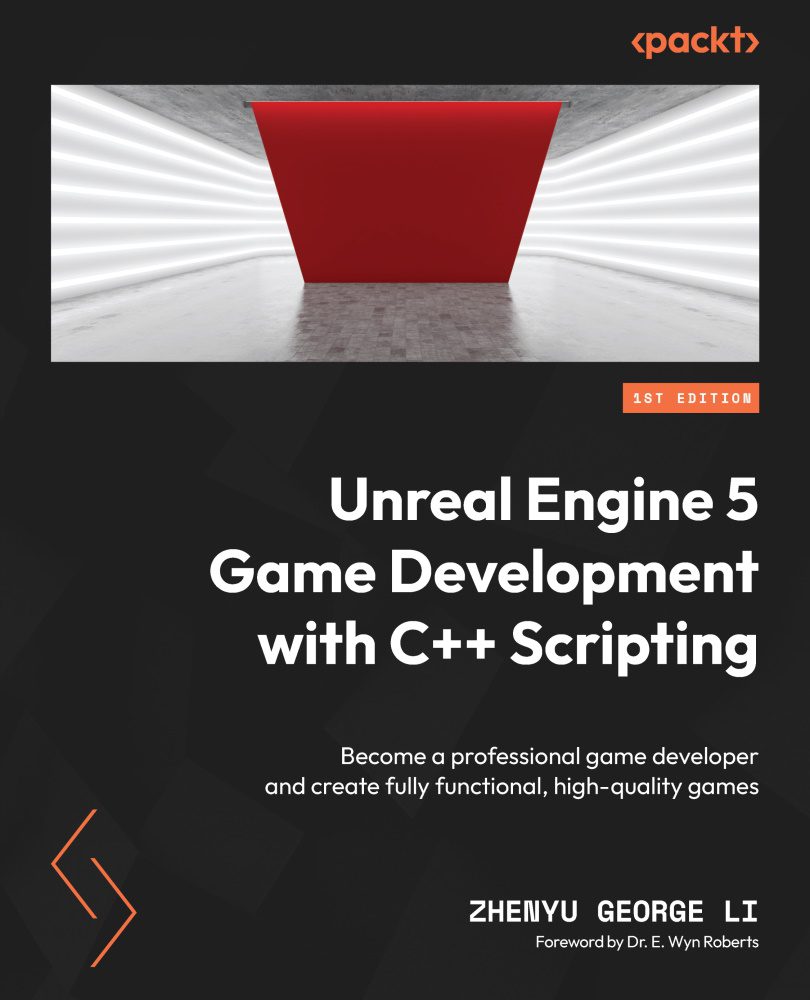Zhenyu George Li is the author of Unreal Engine 5 Game Development with C++ Scripting; we got the chance to sit down and find out more about his experience of writing with Packt.
Q: What is the name of your book?
George: Unreal Engine 5 Game Development with C++ Scripting
Q: What are your specialist tech areas?
George: Software and game development with game engines (unity and Unreal) and programming languages (C++, C#, etc.)
Q: How did you become an author for Packt? Tell us about your journey. What was your motivation for writing this book?
George: The PACKT representative reached out to me about the book when I was thinking about a book on the same topic.
Q: What kind of research did you do, and how long did you spend researching before beginning the book?
George: I had been using and teaching Unreal for years and just tried out Unreal 5 after it was released. I found some changes and new features and made the notes. For writing the book, I decided to develop a demo game to cover some fundamental programming skills for the book.
Q: Did you face any challenges during the writing process? How did you overcome them?
George: One challenge is that the formatting standards are different from my previous experience. Thus, I paid attention to the editor’s feedback and tried to apply them in future writings. Another challenge is that I had to spend extra time to work on the demo game ahead of writing the chapters.
Q: What’s your take on the technologies discussed in the book? Where do you see these technologies heading in the future?
George: This book helps developers to use C++ in Unreal and introduces some new Unreal 5 features and C++ APIs to readers. It will help the reader to use Unreal 5 in their future development practices.
Q: Why should readers choose this book over others already on the market? How would you differentiate your book from its competition?
George: This book is based on a complete game demo. Instead of listing all the APIs, this book focuses on techniques and skills that readers need to work on a playable game, which builds up their ability to learn further by themselves in various areas when needed.
Q: What are the key takeaways you want readers to come away with from the book?
George: Object-oriented design and programming concepts are the keys to using Unreal Engine, especially for non-programmer developers. Both defining game objects and scripts are based on object-oriented technology.
Q. What advice would you give to readers jumping into this technology? Do you have any top tips?
George: Readers should know what they want and how to achieve their goals. In the meantime, readers should be aware of the possibility of extending their knowledge for real development works by themselves.
Q. Do you have a blog that readers can follow?
George: I currently don’t have the blog.
Q: Can you share any blogs, websites, and forums to help readers gain a holistic view of the tech they are learning? What are the key takeaways you want readers to come away with from the book?
George: No, I don’t have the blog for now. Once I have time, I will create one later.
Q. How would you describe your author’s journey with Packt? Would you recommend Packt to aspiring authors?
George: I was well supported by the PACKT team. From the writing instructions, editor feedback, and proofreading, to marketing the book, the team helped me a lot. I would recommend other authors to work with PACKT.
Q. Do you belong to any tech community groups?
George: No, I currently don’t belong to any tech community group.
Q. What are your favorite tech journals? How do you keep yourself up to date on tech?
George: I am always interested in learning new technologies and working on games.
Q. How did you organize, plan, and prioritize your work and write the book?
George: I just make sure I get my work done first and use most of my spare time on this book.
Q. What is that one writing tip that you found most crucial and would like to share with aspiring authors?
George: Spending enough time to plan and organize the book contents is the most important work that needs to be done before starting writing. If it involves a demo project, you have to complete it before starting the writing too.
Q. Would you like to share your social handles? If so, please share.
George: LinkedIn
You can find George’s book on Amazon by following this link: Please click here









